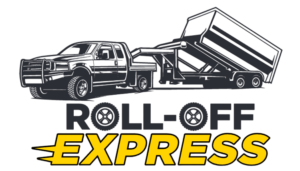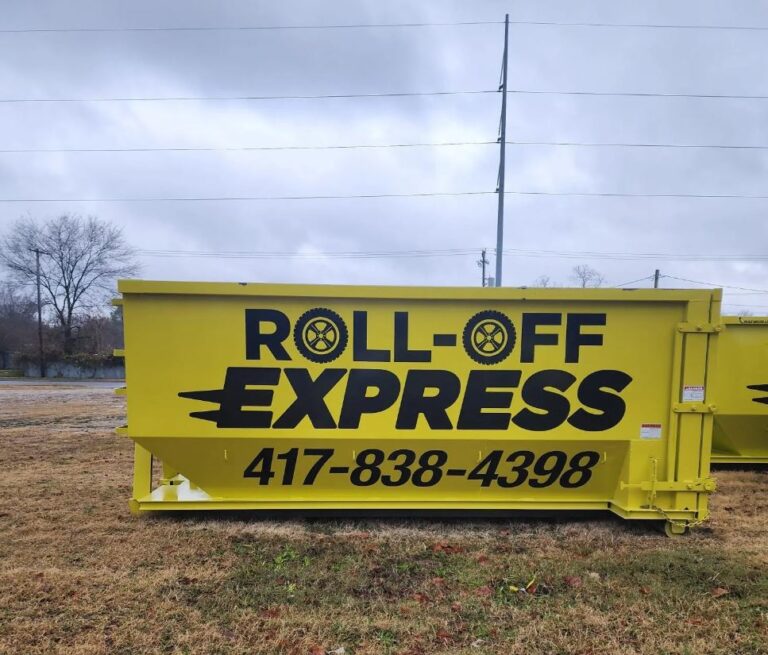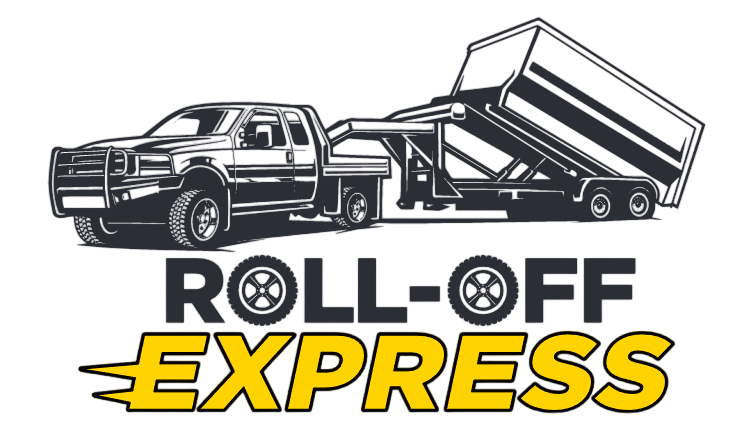

In a dumpster rental, you can typically include yard waste, non-hazardous household items, demolition debris, green waste, and certain types of furniture. It’s important to understand local regulations and the dumpster rental company’s policies for proper disposal. This ensures adherence to legal and environmental standards, preventing fines and promoting sustainable waste management.
Stay informed and prevent costly errors by exploring Roll-Off Express’s comprehensive guide on what you can put in a dumpster rental below!
Regular household waste like kitchen garbage and similar non-organic trash is typically acceptable in dumpster rentals.
Wooden furniture, excluding those treated with hazardous chemicals, is often permitted.
Non-hazardous appliances such as microwaves and toasters are generally allowed, but those containing harmful substances like refrigerants are not.
Organic materials like grass clippings and leaves are acceptable. However, larger items might have restrictions.
Clean, uncontaminated dirt can be disposed of, but keep in mind the weight restrictions for your rental.
Electronics without hazardous components, such as TVs and computers, are permissible, but always remove lithium batteries.
Standard household alkaline batteries can be thrown away, but check local regulations for disposal guidelines.
These can be disposed of if completely empty, as they no longer contain hazardous materials.
Materials from demolition projects, including wood and non-asbestos insulation, are typically allowed.
These heavy materials are often permitted, but be mindful of the weight limits of your dumpster.
Common debris from construction or renovation, like tiles and non-toxic wall coverings, can be included.
Untreated and non-hazardous lumber from construction or renovation projects is generally acceptable.
Natural debris from storms, such as branches and leaves, can be placed in dumpsters, subject to size limits.
Roofing shingles, particularly asphalt types, are often allowed but verify with the rental service for any weight considerations.
We suggest reading this great article on ‘What Can You Put in a Dumpster?’ for the do’s and don’ts of disposal.
These items are usually not allowed due to the hazardous substances they contain, like Freon.
Due to environmental concerns and space consumption in landfills, old tires are typically not accepted.
Leftover paints, lacquers, and similar products require special disposal due to their toxic nature.
Products containing flammable or toxic materials, such as certain glues and adhesives, are not suitable for dumpster disposal.
Batteries like lithium or car batteries are hazardous and should be disposed of through specialized recycling programs.
Items like chemical cleaners, solvents, and pesticides require specific disposal methods due to their potential harm.
Such waste poses significant health risks and requires specialized disposal services.
Especially those from older homes, these may contain hazardous substances and are typically not allowed.
These materials often contain harmful chemicals and should be managed by hazardous waste disposal services.
Automotive fluids and oils are hazardous and typically have specific recycling protocols.
A known carcinogen, asbestos requires careful handling and disposal by certified professionals.
Many cleaning agents are toxic and not allowed in standard dumpsters.
These contain harmful materials and should be recycled through specialized programs.
Soils contaminated with hazardous materials are not suitable for standard disposal.
Often treated with chemicals, these are not suitable for regular dumpster disposal.
Containers that once held hazardous substances pose contamination risks and are generally not allowed.
To learn more about prohibited items in a rented dumpster, we recommend checking out the ‘What Can’t You Put in a Dumpster?’ blog on Dumpsters.com for detailed information
Sometimes accepted, but may incur an extra fee.
Certain types of upholstered furniture are allowed, but it’s best to check with your dumpster rental provider.
Small amounts of food waste are usually okay, but large quantities from events may need special consideration.
Similar to other yard waste, these might be accepted but always check for any extra fees or size limitations.
When renting a dumpster, consider the project’s scope, local laws, and the type of waste materials. Choosing the right size and type of dumpster, like a roll-off dumpster or construction dumpster, is essential. Selecting the appropriate dumpster ensures efficiency in waste management and compliance with local regulations.
Weight limits are crucial, especially for heavy materials like construction waste. Overloading can lead to additional fees. Staying within weight limits is essential for safety and to avoid extra costs associated with overloading.
Local regulations dictate waste disposal rules, including restrictions on hazardous substances and the need for permits in some cases. Familiarity with these regulations is key to ensuring legal compliance and avoiding potential fines.
For the latest guidelines, check out ‘Dumpster Permits 101’. You won’t regret it!
Clear communication with your dumpster rental company is essential, especially when disposing of specific items like latex paints, automotive fluids, or any particular item that might be questionable. Direct discussions with your rental provider will clarify what is allowed and ensure that your waste disposal adheres to all relevant guidelines.
Different rental companies have varying policies. Confirming acceptable materials helps avoid extra fees or the rejection of certain waste materials. Understanding what each company allows prevents the inconvenience of having to remove prohibited items from your load.
Adherence to local regulations is vital to avoid penalties and ensure environmentally responsible disposal practices. Compliance with local laws not only avoids legal issues but also contributes to responsible environmental stewardship.
Consider eco-friendly disposal methods and recycling options for various waste materials. Choosing environmentally friendly disposal options helps reduce the ecological footprint of your project.
Ensure the dumpster placement is safe and does not obstruct access to your property. Safely placed dumpsters prevent accidents and ensure smooth operations during loading and collection.
Incorporating these considerations will help you make an informed choice for your waste disposal needs, balancing project requirements, budget, and environmental considerations.
An overfilled dumpster is one where the contents exceed the top edge or boundary of the dumpster. This can create safety hazards, as materials can fall out and cause injury or damage.
Dumpsters are typically emptied by waste management services using specialized trucks equipped with hydraulic lift systems. These trucks lift the dumpster and tilt it to empty its contents into the truck’s storage compartment.
Yes, dumpsters can attract rats, especially if they contain food waste or other organic materials. Regular cleaning and proper waste management practices can help mitigate this issue.
Items in a dumpster are usually taken to a waste management facility, where they are sorted. Recyclable materials are separated for recycling, while non-recyclable items are often taken to a landfill or incineration plant.
You should not put hazardous materials, such as chemicals, batteries, asbestos, paint, and electronic waste, in a dumpster bag. Also, large appliances, tires, and flammable materials are typically prohibited.

Roll-Off Express | LETS TALK TRASH | Dumpster Rentals